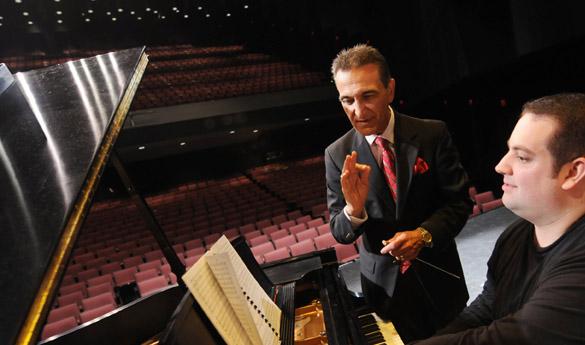Q&A with Mason alumnus turned composer, Vinny Oppido
Los Angeles-based composer Vinny Oppido has a lot to boast since graduating from George Mason University in 2010. This past weekend, Oppido returned to Mason to perform with the American Festival Pops Orchestra alongside its conductor and Mason professor, Anthony Maiello.
Oppido recently worked on composing the music fo this year's Academy Awards and has had original works performed by the likes of Broadway legend Brian Stokes Mitchell.
Oppido spoke with Connect2Mason’s Entertainment Editor, Helena Okolicsanyi, about his experience at Mason, his mentors and the process of composing music.
Connect2Mason: You graduated from Mason a few years ago. What was the biggest influence in leading you to grow in your music composition?
Vinny Oppido: I think the opportunity to have my music performed. [Anthony] Maiello was really supportive and everything I wrote was performed at some point or another. And I think that’s the greatest education, which is to have live-human beings playing your music as opposed to music on just on a sheet of paper. Through that you learn what you should and shouldn’t do, like how a violin double stop isn’t possible sometimes.
|
|
| Composer and Mason alumnus Vinny Oppido (photo couresty of George Mason University School of Music). |
C2M: You had many mentors at Mason. What did those mentors teach you?
VO: Well, I think what’s important from a mentor is that they believe in you. And that they’ll sacrifice themselves for you. I think when you have a teacher who is extremely gifted and nurturing, who believes in you, that’s half the battle. I know situations where mentorships are not very nurturing, very close-ended and I think it makes it very hard for the student who’s studying to have to win your teacher over. I was very lucky to have Maiello be very kind and gracious from the day I met him. I think that he was extremely nurturing and fought for me, gave me the vehicle to have my music played and encouraging me to write and to rewrite. Plus, allowing me to conduct was also helpful.
I also think about my studies with Mark Camphouse. He was a special teacher and I think an excellent teacher for composition. It’s very difficult to teach composition; it’s very difficult to teach someone how to write. And the great thing I learned from Camphouse is scoring and we listened to composers I didn’t know, who opened up my eyes to different types of music which opened up my own vocabulary on writing.
I also learned from Tom Owens and having the introduction to all different types of music helps develop yourself as a composer where the vocabulary increases. So, I think that was very beneficial. And I think what was also beneficial was that no one told me to write in a particular way. I could be me and do what I felt. And looked at how a composer would do something and instead of emulating it looking at it more to learn and as an example. I still do that today always listening to new music.
C2M: When did you realize you first wanted to be a composer?
VO: I don’t remember when it happened. I know I was young. I was always fascinated by the music we were playing in band and I was fascinated by sound and chord progressions. So, by the time I got to high school, I started studying the scores of pieces we were performing and understanding how things worked. For film composing, I just watched films like Star Wars, which had a big influence on me because of John Williams.
C2M:Speaking of John Williams, he’s quite an idol of yours. What is it about his film music that you find so appealing?
VO: Well, it’s a few things. His melodies are just so memorable and just grab you where you’re whistling the tune form the movie by the time you leave the theater. He also has an incredible sense of orchestration of developmental ideas of the orchestra. John is one of the only people who only does pencil and paper for the orchestra, which a lot of people don’t do. I think just his work ethic, his attention to detail, the art of composition, and his place in the linear of composers is inspirational. And it makes you work a lot harder. It makes you a lot more self-deprecating.
C2M: What is your composing process?
VO: I will tell you that when it begins, it’s actually terrifying. To stare at a blank piece of paper is probably one of the most terrifying things. So I’ll write something and look at my sketches and think ‘there’s no way I wrote that yesterday, there wasn’t enough time.’ It’s a very mystical process that no one can explain, other than that there is terror to filling a page with notes. But the thing is once you get an idea and start developing it and working with the orchestra, the process gets a lot better. But the outset is scary.
C2M: What advice would you give to someone wanting to pursue music composition?
VO: I think the first thing is be true to yourself and to your music and to always be writing. Don’t be too influenced by what other people are doing. People will hire you because of what you do. I think what people do is that people look at a lot of recent success and try to emulate that. And I think if you true to who are, I think that’s why people will hire you. Plus, don’t think about your career, just write music, work and take gigs. Life has a very beautiful way of working itself out when you’re not realizing it.


